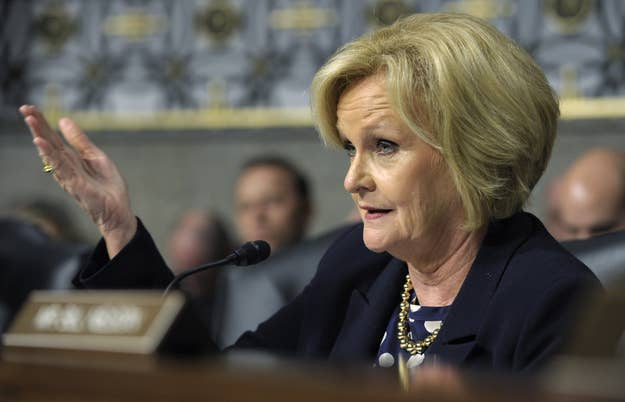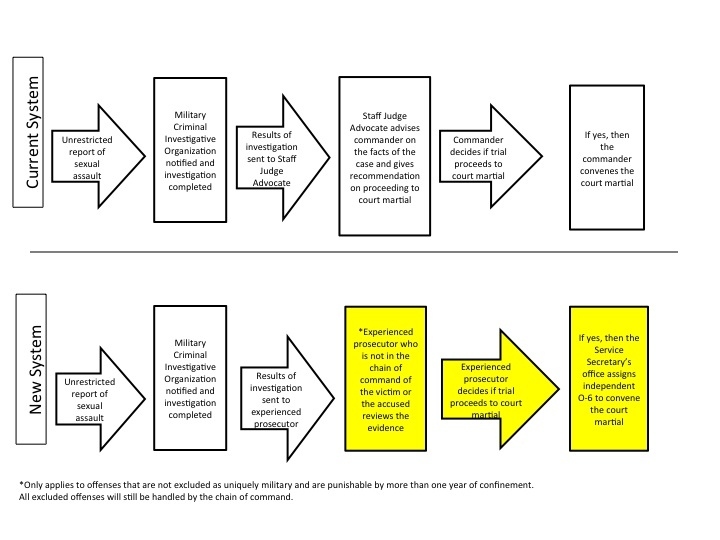
The Senate Thursday passed a set of modest reforms to rules governing sexual assault claims in the military, the culmination of a year-long debate that divided both parties, led to unexpected bipartisan alliances, and represented one of the few policy debates in Congress in years.
Sen. Kirsten Gillibrand was unable to break a filibuster of her Military Justice Improvement Act, which would have created an outside system for addressing sexual assault claims in the military, but lawmakers did pass Sen. Claire McCaskill's more modest, competing plan, which among other things would prevent the "good soldier" defense in assault cases.
Although Gillibrand was defeated, her push for tougher language set off the discourse in the Senate and provided a rare opportunity for a substantive policy debate, a welcome break from the Senate's normal politically motivated rehashes of Obamacare.
Speaking to a BuzzFeed reporter, Sen. Chuck Schumer applauded Gillibrand's effort, saying "she did a very good job."
"There will be a far greater clampdown on sexual assault, even though her bill did not pass," Schumer said, noting that he voted for the bill and believes this will prompt serious changes at the Department of Defense.
Sen. John McCain told BuzzFeed that Thursday's vote was the outcome he wanted, but he feared that Gillibrand would try to attach the legislation to the Senate version of the defense budget bill.
"There will be further discussion," between Gillibrand's office and McCain's as the defense budget moves on the Hill, he said.
Others expressed their doubt that the bill would return in budget debates.
"I think we [already] had this debate; it was very rigorous and I would not expect it coming back this year," said Sen. Kelly Ayotte, noting that there was so much "we can agree to" on the McCaskill proposal. "We have already [received] cloture with 100 votes ... I don't want that to get lost," she said.
While McCaskill's bill passed with bipartisan support, some organizations that advocate for military sexual assault survivors and have been pushing for Gillibrand's bill for months expressed dissatisfaction with the outcome of the vote, saying McCaskill's bill doesn't go far enough to protect survivors of sexual violence.
"This filibuster condemns service members to an arbitrary and broken judicial process in which conflict and personal bias control the adjudicatory process," said a representative from Protect Our Defenders, an organization that advocates for military sexual assault survivors.
What exactly is the difference between the McCaskill and Gillibrand bills? What would they do?

Why did Gillibrand's bill fail?

Under the Military Justice Improvement Act, experienced prosecutors outside the chain of command would review the evidence and decide if the trial should proceed to a court martial.

Military leaders fiercely opposed changing the authority outside of the chain of command to determine which cases get prosecuted, arguing that commanders should maintain responsibility over the health and welfare of their soldiers. Removing their authority "would undermine their ability to lead," military officials said, and in June 2013, about a month after the bill was first introduced, it failed in the Senate Armed Services Committee.
Gillibrand told NPR that commanders are not experts on sexual assaults and are therefore unable to properly safeguard and prevent retaliation against victims who report crimes.
"Frankly, they've failed up until now to keep the command climate free of assault, rape, and retaliation," she said.
Although the bill lacked military support, it did gain bipartisan backing from senators, including Republicans Rand Paul of Kentucky and Ted Cruz of Texas, as well as 16 of the Senate's 20 female members. However it was not enough to get the 60 votes necessary for the bill to move on.
McCaskill was a strong critic of Gillibrand's bill, arguing that it went too far and could even negatively affect a commander's ability to maintain the military command structure. She also pointed out that Gillibrand's bill does not criminalize retaliation.
"Making retaliation a crime is huge, and by the way, there's nothing in the Gillibrand proposals that does anything about retaliation," McCaskill told The New Republic.
"If you want more prosecutions, and if you want to hold the commanders accountable, I think it's a dramatic mistake to allow the commanders to walk away, and I think it's a dramatic mistake to say a lawyer half a continent away is going to make the call and that somehow is going to protect this victim more from retaliation and result in more cases going to court," McCaskill said in an interview with The Washington Post.
Many sexual assault victims had advocated for Gillibrand's bill, and in a recent hearing, survivors spoke out about their own experiences reporting assaults to their commanders.
Although Gillibrand's bill failed, most senators agree that sexual assault in the military is a critical problem, which explains why both bills garnered bipartisan support.
Legislators' focus on sexual assault has increased during the past year in response to growing awareness over its prevalence in the military. A Pentagon survey released last year said an estimated 26,000 cases of unwanted sexual contact and sexual assaults occurred in 2012, a 37% increase from 2011.
Although excluded from his State Of The Union, President Obama addressed sexual assault in the military during a speech to Marines at Camp Pendleton in August.
"No military unit can succeed without discipline, without trust and cohesion," he said. "So I want you to hear it directly from me, the Commander In Chief: It undermines what this military stands for, and it undermines what the Marine Corps stands for when sexual assault takes place within our units... And that message is coming all the way from the top."

